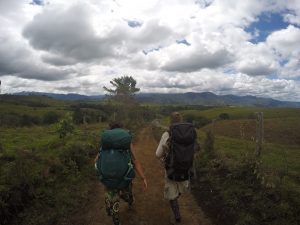
Photos by Sam Brake Guia
“When the earth is ravaged and the animals are dying, a new tribe of people shall come unto the earth from many colors, classes, creeds, and who by their actions and deeds shall make the earth green again. They will be known as the warriors of the Rainbow” –– An Old Native American Prophecy at the heart of Rainbow Gatherers and the Crystal Land’s mission.
I had arrived at San Agustin with a lot of curiosity and very little information. I was searching for the Crystal Land. A society that had been established in the mountains of Colombia by people from all over the world based on the principles of the Rainbow Gatherings.
Before arriving I had briefly spoken with Lucas, the admin of the society’s Facebook page which consisted of over 600 members. However, this is a society that lives off the grid with little to no attachment to technology, so my interaction with Lucas over Facebook was brief.
And yet, he gave me all the information I needed to start my journey. I knew the Crystal Land was near San Agustin in southern Colombia and I had also been informed that the society travels to the town every Monday to collect a small handful of supplies from the local market. Armed with this information I grabbed my backpack and headed to the small Colombian town.
Early Monday morning I scouted out a local hostel in search of Rainbow gathers who had just returned from the recent gathering, a temporary event which takes place all over the world where rainbow gathers come to celebrate throughout the lunar cycle for 28 days.
I found a couple of young travellers named Esma, a French-born Morrocan girl who now lived in Amsterdam and her Italian travel partner Felipe. They had attended the gathering a week before but were heading back later that day. They welcomed me to join them and we made plans to set off to catch the bus at noon.
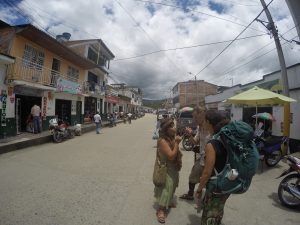
At 11.30am we left the hostel and headed towards the town center in the sweltering midday sun. Upon every corner we bump into an attendee of the gathering, embracing my new companions with warm hugs and best wishes. It was incredible to see such a large expat community so heavily integrated into this small Colombian town, a peaceful fusion of such juxtaposing cultures.
When we made it to the market it was clear we were too late and had missed the bus. Esma and I took sanctuary in the market shade from the blazing sun while Felipe searched for an alternative ride. Shortly after this, three men pulled up on motorbikes, ready to give us a ride. I hesitantly got on the back of a bike with a boy that looked barely old enough to ride. I held on for my dear life as we whizzed through the town’s streets which quickly became dirt roads leading off into the mountains.
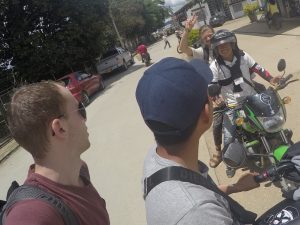
After an intense 25 minute ride, we finally made it to a dirt road that would lead us to the Crystal Land. Esma, Felipe and I paid the guys 10,000 pesos each and headed down the muddy dirt road leading into the distant woods and mountains. We crossed streams, passed through thick shrubs and hiked treacherous paths for half an hour before arriving at the welcome camp. We were greeted by a handful of gatherers, some in the processes of leaving and others ready to greet newcomers like us. Once stories and hugs had been exchanged we continued to the main camp.
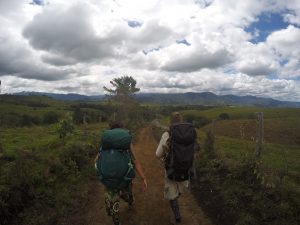
Felipe had told me that upon arrival at welcome camp I would be informed of the rules, something I was keen to learn more about, considering these rules are designed to underpin the entire functionality of this isolated society. This did not happen at welcome camp, so Felipe took the time to sit me down and explain the rules once we had settled down at the main camp.
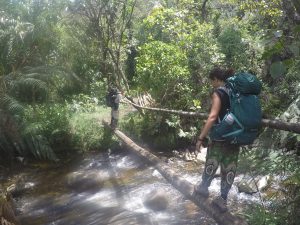
He explained the mandatory practices before going into the set rules. These practices included how to treat the sacred (center) fire with respect and reciprocating calls within the community. For example, when food is being cooked, those within the kitchen must shout “A comer!” (‘eat’ in Spanish), those that hear it must respond with the same at that moment which is later followed by “A comer ahora“. Before eating, it is a tradition to dance and sing, expressing joy and gratitude for the food and for the people around.
Next come the four rules, established so everyone can live in harmony together. Firstly, make no assumptions, speak out and be clear because communication is important. Second, always do your best. Do something with care or don’t do it, as your emotion becomes your energy. Thirdly, honor your word. Be honorable with what you say and do. Finally, don’t take anything personally. Before we started the tour, Felipe adds one additional rule which exists within the Crystal Land, if you see a job it’s yours, essentially if you see something needs to be done, don’t shy away, help.
Once these rules were established Felipe shows me the land and everything they have constructed. In the center of the camp, there is a fireplace which is considered the sacred area with seating carved into the ground like an arena. During a gathering, the fire must be constantly alight from the start of the lunar cycle until the end, throughout the 28 days. Not far from here is the kitchen, a small hut with a roof and a large central table and side table for preparing food accompanied with a fireplace next to the kitchen for cooking.
We then headed up the hill at a steep incline passing the toilets which consisted of holes in the ground with signs marked “shit pits.” Further up the hill was a lush garden, carefully landscaped for a plethora of fruits and vegetables, allowing the Crystal Land’s inhabitants to live off the land. At the top of the hill, we reached the house of Jai, one of the main pioneers of the Crystal Land who first arrived here in 2009 and had originally bought the land in his name. At this moment in time he was elsewhere, but I would meet him later to discover more about how he arrived there.
We moved on to the other side of the hill, which accommodated the original house built on the land. A house that had been there for many years. Not far from this house was Lucas’ home. Built on a steep face of the hill, standing strong on thick bamboo sticks, the house was truly an impressive work of art. All three of these buildings were spread out on this hilltop among thick shrubs, plants, and lush gardens.
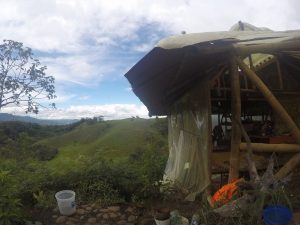
I walked back to the main site, and as I passed Jai’s house, I find him sitting on his porch drinking coffee with Water, a young Canadian from Vancouver who came for the gathering after hearing about it in Costa Rica. I sat down and asked Jai about how he first found the land. Before we start he asks me if I like coffee, I claim I do and he wanders off while I chat with Water. He returned with a delicious cup of sweet coffee.
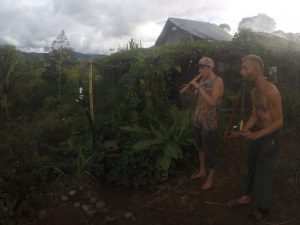
I asked him again how he arrived here and how he decided to purchase this land, to which he simply responded “destiny and opportunity” before going into greater detail. He explained that he had first come here to see a local waterfall in 2009, and when he saw it he just wanted to sleep there and spend the night. He then ended up staying with locals, who thought he would only be interested in staying for six months. However, almost 10 years later an amazing transition had taken place in this very same space. I listened to Jai and Water play their pipes as the sunset dipped over the valley before leaving them and heading down to join the others at the center.
Later that evening, we sat around the empty fire pit eating oats and fruit. Without any instigation, Felipe, who is sitting next to me, pulls out a thick waterproof jacket and hands it to me. It becomes evident that I have come terribly unprepared for the cool nights up in the mountains, given the hoodie I was wearing and my complete lack of a sleeping bag or a tent. I thanked him for the gesture and he smiles back at me with a pat on the shoulder. We then head off to the kitchen to prepare dinner.
As I begin to cut carrots it appears that everyone is working away in one form or another. A number of us are chopping up vegetables preparing food for the vegetable stew, others are by the fire making sure it is ready to stew, and a handful of people are rhythmically hitting drums, amplifying the jungle sensation in this dense Colombian countryside. Others would trek down to the river to collect water, which would usually be available thanks to their plumbing system but, unfortunately, it was broken at that moment in time. It truly felt like a united, hardworking and most of all joyous experience for what would usually be considered a household task of preparing dinner.
Once the food was ready and the usual chants of “A comer ahora!” were bellowed. Everyone gathered in a circle and the singing and chanting began. Following this, everyone was seated and a number of volunteers took it on themselves to hand out food to everyone, as is the tradition to avoid everyone scrambling around the pot at once.
This is an incredibly unifying moment as everyone sits down to eat together. A chorus of languages can be heard from all over the world including Dutch, Turkish, English, and Spanish to name a few. However, no matter what language everyone is speaking there is an overall sense of inclusion. As bowls begin to empty more volunteers take it upon themselves to offer seconds, and even thirds following this round. Throughout my time there I can honestly say I was never hungry thanks to what felt like a prodigious amount of food produced from a very large cooking pot.
After dinner, while everyone was gathered, the group began to discuss plans for how to prepare and maintain the grounds now the recent Rainbow Gathering had passed. I was informed by the girl sat next to me, Anna an LA native, who said during Rainbow Gatherings life was fairly routine, however, now it was important to ensure that life continued on the Crystal Land in an orderly fashion with clear and unanimous guidelines.
It was agreed that this would be discussed tomorrow around the firepit. However, when the topic of what would be discussed started, numerous people in the group naturally had their part to add. It was getting late and I had nowhere to sleep, so Anna guided me through the dark up the steep hill to the communal house where I was lucky enough to have one of the few beds available. To my surprise, for all my lack of preparation, it was a very long and refreshing sleep, which was enhanced by the melodic sound of being surrounded by nature as I drifted off to sleep.
The next day I was shown more of the camp, mostly consisting of clusters of tents in various parts of the land separated by thick shrubs and trees, connected by thin paths cut out by the residents. While preparing breakfast, I met Lucas, the administrator and one of the leading pioneers of the Crystal Land, who was excited to speak with me. We sat down by the firepit together and he explained his past.
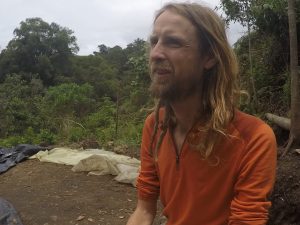
Lucas Jarosch
He was born in Poland and grew up in Germany, but left for a trip after graduating where he discovered a life-changing experience in Yucatan, Mexico, while living in nature. He found when he returned to Germany, he did not feel the same, and it was hard to readjust back to normal society. He then set out to find similar experiences in Europe. After visiting many festivals, he heard about a Rainbow Gathering. Baffled by the idea, he visited his first gathering in Europe and was immediately hooked by the attitude and serenity of the attendees. He then continued his travels, searching for new experiences and other gatherings before finding Colombia’s Crystal Land in 2015. Since then he has become a key member of the society and the site’s development.
He then gave me a personal tour and showed me around the parts I had already seen, but this time with more information and clear hopes for the future. At the top of the hill next to Jai’s house, he pointed across the valley, highlighting the land they intended to buy to extend their project, once they raise sufficient funds. Then he took us to his house constructed on the side of the hill. He explained that it had only cost $2,000 to build, an impressive achievement given its structure.
We then began to discuss what he hoped he would develop on the land over the next two years. He explained that self-sufficiency was the key and that living off the land and enhancing their own resources would be their main goal. Incredibly, if a person lived on the Crystal Land, working to produce their own food, visiting the town once every 2-3 weeks for necessities, Lucas claimed they would only spend $40 a month, a monthly expenditure which really goes to show the self-sufficiency this place has fostered.
He emphasized that a school and health center would be their next priority. He also explained that a birth had already taken place on the Crystal Land, but he wanted it to be possible for anyone to give birth here with the right facilities, providing a more harmonious birth was available for both mother and child. This was an interesting topic to finish our conversation on because as I began to prepare to leave the Crystal Land, I spoke with Karra, a Canadian woman who slowly fell in love with the place, and spoke of plans to raise a family there with Jai.
I left during the meeting to discuss plans moving forward. I was cautious not to interrupt it. However, I had to bid farewell to Felipe, given all his kindness and all his efforts to make this obvious outsider feel at home. I left and waved goodbye and was met with a united goodbye from the group, before hiking back to the main dirt road and hitchhiking back to San Agustin. My time there was short, but in that small space of time, I was welcomed with open arms, clothed and fed by some of the kindest people. No society is perfect, but the unity and generosity of everyone involved certainly gives me hope that the Crystal Land will prevail and prosper for many years to come.
If you would like to help and support their course, or simply find out more, feel free to visit their Gofundme page.




